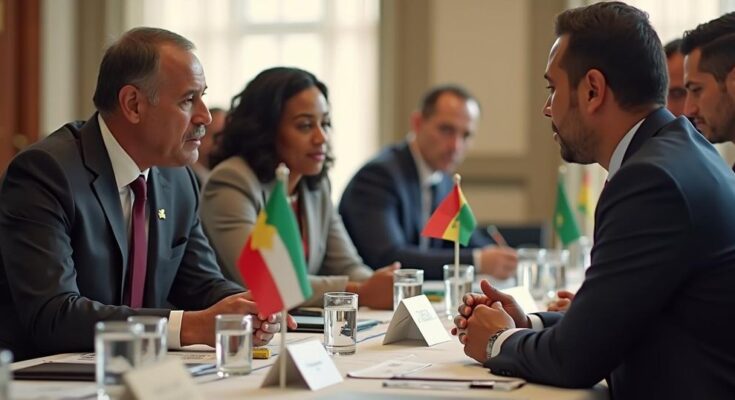The presidents of Somalia, Eritrea, and Egypt convened a summit to strengthen security cooperation in response to threats from al-Shabab in Somalia. Emphasizing the respect for sovereignty and territorial integrity, the leaders agreed to coordinate efforts to combat terrorism and promote regional stability. The agreement may affect Ethiopia due to its military presence in Somalia and ongoing disputes. The summit highlights the urgent need for collaboration amid a volatile backdrop of regional tensions.
In a significant development for regional security, the presidents of Somalia, Eritrea, and Egypt convened a summit in Asmara, Eritrea, to enhance cooperation in addressing security challenges, particularly against the al-Shabab militant group that poses a threat to Somalia. This meeting, called by Eritrean President Isaias Afwerki and attended by Egyptian President Abdel Fattah al-Sisi and Somali President Hassan Sheikh Mohamud, reaffirmed their commitment to bolster security ties and promote stability in the Horn of Africa. During the summit, the trio emphasized the necessity of respecting the sovereignty and territorial integrity of all nations within the region. They expressed their collective intent to counteract any external interference in regional affairs and to coordinate efforts towards sustainable development and stability. Given Somalia’s current military efforts against al-Shabab, the leaders underscored their resolve to strengthen collaboration to combat terrorism, secure both land and maritime borders, and uphold national integrity. The newly formed security agreement may have implications for Ethiopia, which has deployed thousands of troops in Somalia to combat al Qaeda-affiliated groups. Relations between Mogadishu and Addis Ababa have deteriorated, especially regarding Ethiopia’s plans for a port in Somaliland, an area not internationally recognized as a sovereign state. In light of these tensions, Somalia had previously entered a strategic military accord with Egypt, wherein Cairo offered support for a new African Union mission aimed at tackling al-Shabab. The backdrop to these discussions includes ongoing disputes between Egypt and Ethiopia over the construction of a dam on the Nile River, alongside Eritrea’s historical grievances with Ethiopia stemming from the latter’s recent conflicts. Nevertheless, Ethiopia’s Foreign Ministry has characterized its relations with Eritrea as peaceful, emphasizing a shared commitment to neighborly respect.
The meeting among the leaders of Somalia, Eritrea, and Egypt is situated within a complex backdrop of regional instability, particularly due to the persistent threat posed by militant groups like al-Shabab in Somalia. Eritrea and Ethiopia have experienced turbulent relations, exacerbated by recent conflicts in Ethiopia, including the Tigray wars. This summit reflects an attempt by these nations to forge a united front against common threats, while also navigating their intricate political relationships with one another. The ongoing disputes over resource management, territorial integrity, and international recognition of statehood contribute to the fragile dynamics at play in the Horn of Africa, thus necessitating stronger security collaborations.
In conclusion, the recent summit among the leaders of Somalia, Eritrea, and Egypt marks a pivotal step towards reinforcing security cooperation in the face of regional threats. Their commitment to uphold sovereignty and tackle terrorism collaboratively is crucial for promoting stability. However, this agreement also introduces new dynamics in the ongoing tensions with Ethiopia, necessitating careful diplomacy moving forward. The developments signal a concerted effort by the Horn of Africa nations to unify against shared challenges while addressing the underlying complexities of intra-regional relationships.
Original Source: www.aljazeera.com




